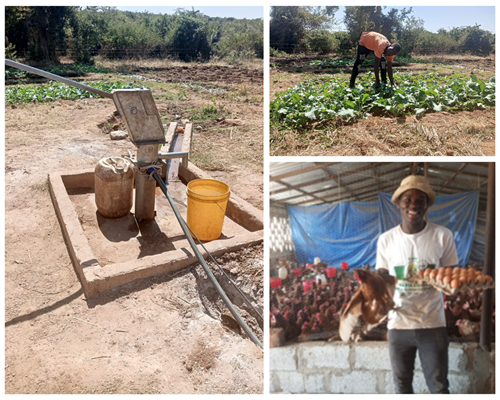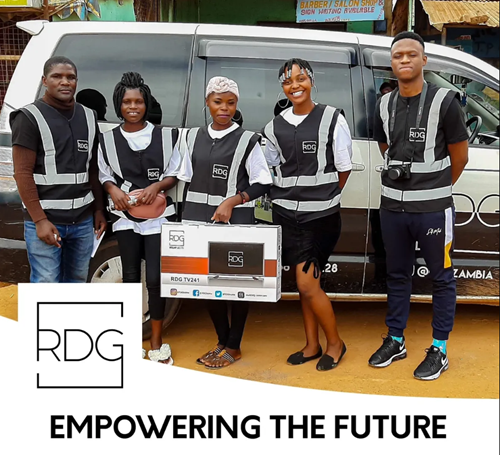Greener pastures, happy chickens and contented home owners

Savie Soko in his vegetable field irrigated with solar power
Savie Soko in his vegetable field irrigated with solar power
As part of our monitoring of off-grid energy suppliers funded by the Beyond the Grid Fund for Africa, NIRAS recently met with some end users of solar-powered solutions in Zambia
Savie Soko is a smallholder farmer operating in Zambia’s Chilanga district, west of Lusaka, the capital. He grows vegetables and raises poultry for a living. Like many smallholders, for some time, his ability to expand production had been limited by his lack of easy access to sufficient water supply. A single hand-pump borehole serves the entire farm’s daily water needs, and – until recently – Savie and Dennis his young employee spent a lot of time and effort keeping a small area of crops watered and the thirsty chickens hydrated.
Frustrated by his inability to grow the business due to manual-intensive demands on his time, Savie approached RDG Collective, a local off-grid energy supplier offering solar-powered water pumps and other solutions. He signed up for a ‘Pay-As-You-Go’ (PAYG) account and received two 330-watt solar panels, a pump with a 2750-litre flow rate per hour, a controller and 50 meters of poly pipe. He purchased a 5000-litre tank and built a 2-meter high tank stand, and RDG stepped in with free installation services to package the entire system.
“The solar pump has made our work very easy and has even enabled us to expand our horticultural production. We are now doing land preparations and laying drip lines for our next 1-acre tomato production project. Even water supply to our chicken run has greatly improved thereby boosting egg production. In addition, we now have more time to do other things thereby making us more productive. There have also been added benefits to the surrounding community who come here to draw water for household use and their animals.” Savie told Kenneth Zulu, NIRAS’ Monitoring, Reporting and Verification expert on a recent visit to his farm.

Tackling energy poverty by bridging the finance gap
RDG Collective is one of many companies in Zambia and across Africa offering solutions that employ innovative consumer payment schemes to deliver affordable clean energy to those without access to electricity. Despite demand and its successful model, RDG – like many operators in the off-grid solar sector – faces challenges in scaling up due to a lack of access to finance. Although the sector is estimated to generate $1.7 billion in annual revenues globally, and the 840 million people with no access to electricity represent a significant opportunity for growth, investors and the banking sector still view this as a risky market.
To help off-grid energy service companies interested in expanding their business, the Beyond the Grid Fund for Africa (BFGA) offers financing through funding rounds. Launched in 2020 and managed by the Nordic Environment Finance Corporation (NEFCO), BGFA is today a multi-donor-funded programme that operates in partnership with the international Renewable Energy and Energy Efficiency Partnership (REEEP) and NIRAS in Burkina Faso, Liberia, Zambia, Mozambique, Uganda, and the Democratic Republic of the Congo. NIRAS supports the Facility with independent local monitoring, reporting and verification of contracted companies - the energy service providers. At the time of writing, BGFA has contracted 21 companies, 9 of which are based in Zambia.
A core goal of RDG has been to scale the distribution of productive-use appliances throughout Zambia, creating a significant and sustainable impact on rural communities. We have been fortunate to partner with BGFA, who shares this goal and has been instrumental in supporting our distribution of solar water pumps and fridges. BGFA's innovative results-based financing, combined with technical assistance, will ensure RDG successfully empowers thousands of off-grid households and businesses in the coming years.
Rune Gunnar Dige – Founder and CEO, RDG Collective
TVs, phones and fridges powered by the sun
About 120 km north of Savie’s smallholder farm, Richard Milimo Malambo of 15 Miles, Chibombo District, has achieved his lifelong dream of building his own home. But the excitement was quickly clouded by the realisation that “with new things come with new challenges”. Far from the national electricity grid, Richard found himself with no lighting or means to charge his phone. He too turned to RDG Collective and signed up for a Spark 1 lighting system, which comes with a 20- watt solar panel, 42-watt hour battery, four LED bulbs and a phone charging cable. So impressed was Richard with the performance of the system, he went back a second Spark 1 system and a bigger F3 package, which consists of a 65-litre fridge, two 120-watt solar panels, a 32-inch TV, and an additional solar panel, battery, and bulbs, all installed at no cost.

RDG operates with a network of agents located across rural and urban areas who visit communities and households and, in addition to sales ensure customer feedback makes its way back to the firm. The company also operates service centres in provincial towns where people like Richard and Savie can go for support. In addition to its strong emphasis on training and employee empowerment, this customer-focussed approach is one of the reasons RDG was successful in attaining funding from BGFA.
In Zambia, almost 2.4 million households still lack access to electricity as well as affordable appliances. With BGFA support, RDG’s PAYG credit offering, solar home systems and solar-powered fridges and water pumps aim to transform the fortunes of households throughout Zambia and beyond.
